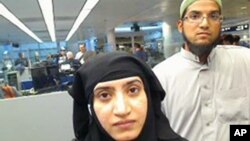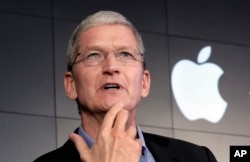The CEO of Apple on Wednesday rejected an order by a U.S. judge to help the FBI access an iPhone used by one of the shooters who last year killed 14 people in California. The decision has set the stage for a high-stakes legal fight between the technology industry and the United States government.
What is the FBI asking Apple to do?
The FBI wants Apple to help it access an encrypted iPhone used by Syed Farook, who along with his wife, Tashfeen Malik, carried out the mass shooting in San Bernardino in December.
Investigators say they don’t know whether anything relevant is on the phone, but that they are unable to access the information because they don’t know the password. They want Apple to create software that would bypass a self-destruct feature that erases the phone’s data after too many unsuccessful attempts to guess the password. Investigators want to be able to try different combinations in rapid sequence until they find the right one.
Why does Apple oppose the idea?
Apple CEO Tim Cook said Wednesday the company was being asked to take an “unprecedented step” that would threaten the security of Apple’s customers.
He said building the software to defeat Apple's own security measures is "too dangerous to create." He cited the need to protect information from hackers and criminals.
Cook said the company has no sympathy for terrorists and has provided the FBI with data it has in its possession and engineers with ideas on other options investigators could use.
"While we believe the FBI's intentions are good, it would be wrong for the government to force us to build a backdoor into our products,” Cook said. “And, ultimately, we fear that this demand would undermine the very freedoms and liberty our government is meant to protect."
What is at stake in this standoff?
Apple is most worried that if it complies with the FBI request, it will set a precedent for future requests — from the U.S. government or from other countries, like China. There are few earlier rulings courts can use for guidance, and Apple does not want to pave the road for similar requests to itself and other tech companies.
Apple boosted encryption on its phones in 2014 after increased scrutiny on digital privacy. The government has complained that the higher security measures make criminal and national security investigations, such as the California shootings, more difficult.
What's next?
Apple will most likely file an appeal with the court in the coming days. The legal fight is expected to drag on for a long time.












